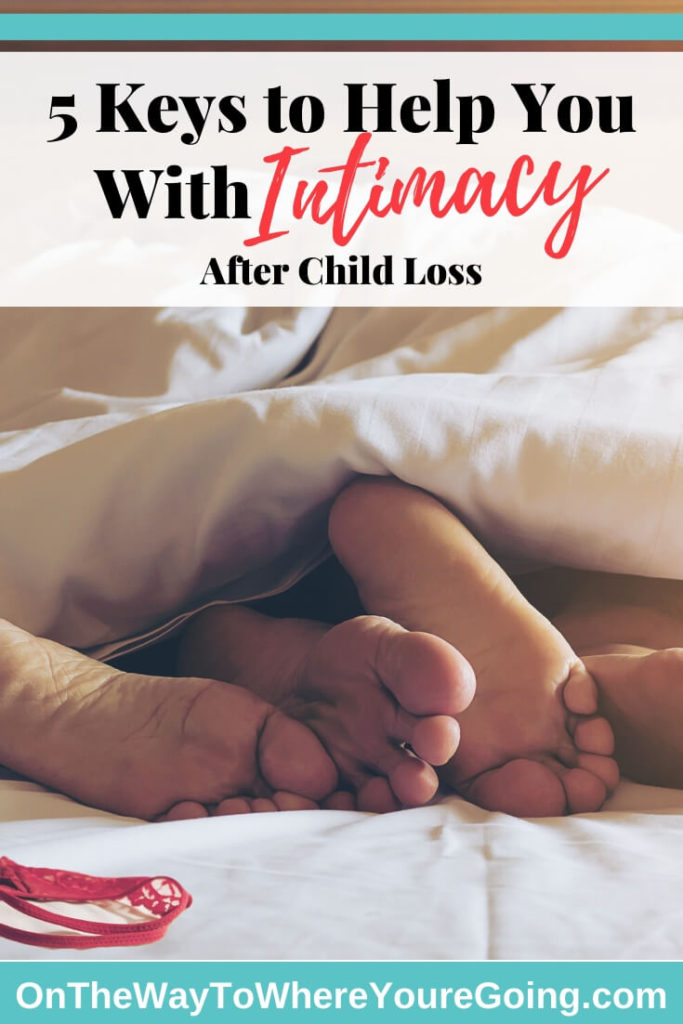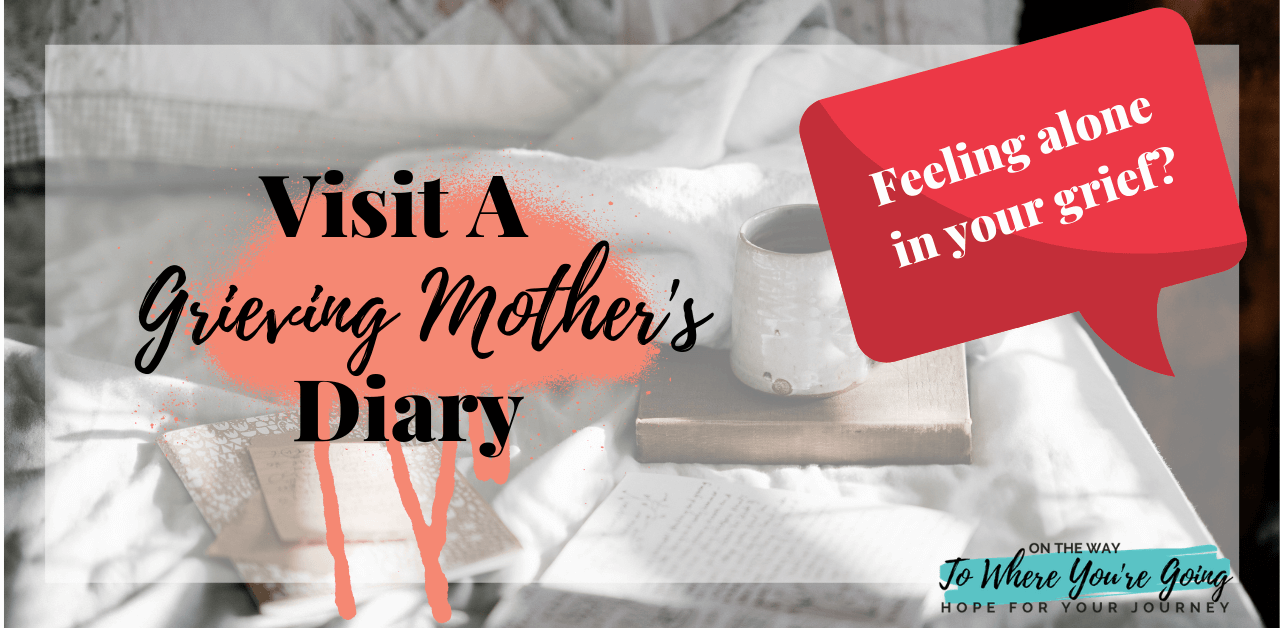“Who’s pumping this techno music in my ear in the middle of my perfect slow dance? That’s what intimacy while grieving feels like.”
Intimacy after child loss can be hard. The day we got married, I didn’t think we’d have issues with our sex life. To be honest, I didn’t think about many of the issues we’ve experienced since getting married. Nobody thinks they’ll be “that” couple.
But, things happen. Sometimes, bad things happen. And, when they do, you’re left with the aftershocks, while picking up rubble in your bathrobe. And… that brings us to sex, because intimacy after child loss can be pretty tricky.

Sex While Grieving Can Be an Intricate Dance
Who’s pumping this techno music in my ear in the middle of my perfect slow dance? That’s what intimacy while grieving feels like. In the midst of every quiet moment together, every sweet sentiment, hug, or rub, there’s this loud angst pounding in your head. “My child is dead. My child is dead.” It’s a song of scratchy, uneven rhythmic melodies and it’s always there; never ceasing.
Read Related Post: What was it like the first year after my son died
Imagine dancing to your favorite song with a loud new, throbbing song banging in your ears and through your body, which just so happens to have a totally different beat and in a genre of its own. You and your partner may have been on the same wavelength before, but now you’re stuck tripping over each other’s feet in the worst “slow dance” seen by man.
Why Intimacy After Child Loss Can Be So Challenging
You are both dealing with a loss that is uniquely your own.
The effects of the death of a child on a marriage can be hard to understand. Many people see the couple as going through one of the hardest things they’ve had to experience together. While this may be true, a more precise way of seeing it is to understand that two individual people are walking through the hardest personal trial they’ve ever experienced, to the point that their own identity is questioned. At the same time, they are trying to simultaneously support and walk alongside their hurting spouse.
Read Related Post: I Felt Lost After My Son Died
You see, both partners are walking through hell. They’re experiencing their own personal struggles. A different scratchy melody is playing in their ears, yet they’re silently trying to perform the same perfect slow dance.
One hears, “I can’t believe my child is dead. My child is dead?! What is happening? How can I fix this?”
The other hears, “I can’t deal with this right now. Don’t think about it. Don’t think about. Don’t think about it. Don’t cry. Please don’t cry right now. Am I going crazy?”
The song changes from day-to-day, moment to moment, but it’s always there with his jarring, techno beats. And the two are rarely listening to the same beat. Their loss is uniquely theirs.
Your needs vary from day-to-do and often conflict.
When someone is hurting, we often try our best to come alongside them and fill in the gaps. We attempt to meet their needs. But, what happens when the two doing the comforting have their own needs and the needs of both parties conflict each other? That’s what sex is like after the loss of a child.
Sex can be comforting. At the same time, it can be a reminder that you feel nothing; absolutely nothing. It can be both of these things at the same time, in the same marriage… and that leads to challenges.
Intimacy after the loss of a child is tricky because we don’t always understand what our partner is thinking.
One partner may question how on Earth her spouse wants to have sex. “How can they enjoy anything? How can I get up and enjoy my day, having sex with my spouse like everything is normal, when my child didn’t wake up this morning? How? How is this possible? How is this my life? What happened?”
While this spouse is expecting comfort in a dark time, the other spouse is feeling rejected. “How can my spouse be so unloving? This is the absolute worst time in my life. I need them. Where are they? I need to feel loved. I need to have sex. I’m so lonely.”
The problem? Neither of the two know what the other is thinking. They don’t even ask. In fact, they are both appalled at the insensitivity of the other during such a devastating time. Both, assume that the other is viewing the situation from the same perspective… playing and hearing the same tune. And once they pick up on this little nuance, the song changes and the rat enters the maze again.
Hurting people hurt people.
Imagine being dropped by your best friend during a really hard time. Now imagine, your partner leaving you on the dance floor in the middle of a dance routine… with everyone watching. Yeah, that’s how it feels. It hurts. And you know what? Hurting people hurt people. They lash out, they isolate, they throw pity parties, and they saw harsh words. All of these can have a devastating effect on intimacy and can take time from which to heal.
Grief is exhausting.
The physical toll grief takes on your body is surprising to most bereaved parents. Often, they’ve experienced previous losses and feel they understood loss. Then, their child died and they experienced pain they’d never experienced before.
The physical pain was sharp, heavy, and all-encompassing. It’s difficult to stand much less enjoy an intimate moment with their partner. When they’re together, most days they simply end up leaning on each other.
Two exhausted people barely holding the other up. Intimacy after child loss can take a hit simply because the two of you are tired. Tired is a real thing. Give it time.
Mental health can be devastating.
Depression and anxiety can have detrimental effects on a person who is accustomed to having it all together. A once confident person may look in the mirror and not recognize the person staring back at them, after their child dies. They’re sad, ashamed, embarrassed, guilt-ridden, and to top it all off, their sleepless body is riddled with nervous anxiety.
They’re a mess and they don’t understand why. They thought grief felt like sadness. Friend, grief feels like a whole lot of things. It feels like nervousness, fear, physical sickness and pain, loneliness, and a bunch of other things all mushed together. It can feel like you’re losing your mind. You’re not crazy. You’re grieving.
5 Tips for Experiencing Intimacy After Child Loss
Grieving as a couple is HARD. I’m not even going to lie. It’s one of the hardest things I’ve done. It stinks. But, we’re not in control of the bad things that happen to us. We simply control how we walk through them. Here are some strategies to help you walk through this hard time with your spouse.
1. Open Communication
Talk about it. Really talk about it. Be loving, but honest. Explain that broken-tape that keeps playing in your head. Tell your spouse how nothing seems right anymore and you’re just trying to figure out how this dance works. Does sex comfort you during this time or does it disgust you? Does your anxiety make it difficult to engage in meaningful contact/physical touch? Explain this to your partner. They deserve to know that this isn’t a personal attack. They need to get in step with you if you two have a chance of dancing well together. Open communication will greatly improve the satisfaction you get out of your intimacy after child loss.
2. Intimacy isn’t always sex
Remember, intimacy isn’t always sex. It’s spending time together. Talking, snuggling, taking a walk, or rubbing each other’s feet. Intimacy simply means you’re growing closer together rather than being torn apart.
Make a list of some things you can do together which will encourage you to draw closer together. When sex is troubling, pick something from the list as a way of telling your partner that you really do care.
3. Take it slow
Slow and steady wins this race. Grief takes times. Grief after losing a child takes even longer. The first year is spent in a fog. The second year feels like a punch. Finally, the third year, you feel like you can begin to walk again, even if it’s just a wobbly stumble.
Keep hanging in there, and know that the two of you will be forever changed. Yet, you get the opportunity to change together if you’re open to that.
4. Don’t take it personal
This is not a time for the blame game. Really, whether they admit it or not, your spouse is already experiencing their own personal guilt. The lack of sex you two may be experiencing should not be taken personally.
Even if your spouse is angry with you, know that this is a part of their grief that need to experience. Give them grace for this process and know they’re not enjoying the process either. It’s all very painful.
So, in the midst of all this pain, please refrain from character assassination, name-calling, and personal attacks. They will get you nowhere and may, in fact, build a wall between the two of you that may be difficult to tear down… even for years to come.
5. Remember, this is temporary
It’s hard for me to say that this is temporary, because I’m very aware that your child is gone from this Earth forever. So is mine. I get it. I really do. But, always try to remember, that the intensity of the pain you’re feeling today and how you carry it will change.
You’ll grow. You’ll become stronger, and you’ll be able to carry it with greater ease. You’ll never be the same, but you will be better. You can do this, Friend. We both can.
xoxo,
Rachel
Join my newsletter. You’ll also gain access to helpful resources.



